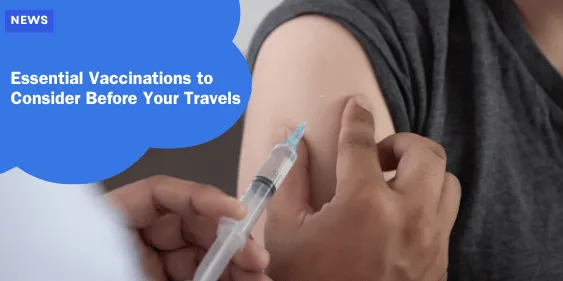Essential Vaccinations to Consider Before Your Travels

Introduction
Traveling can expose individuals to various health risks, including illnesses that may not be prevalent in their home countries.
While a mild stomach bug might affect many travelers at some point, awareness of more serious diseases is crucial.
Among these, mpox—a viral illness previously known as monkeypox—demands particular attention.
This disease, which had a fatality rate of 10% in its early days, now has a lower mortality rate of approximately 3.3%.
Global Concerns
In August, a significant development occurred when Sweden confirmed a case of a more severe strain of mpox, known as clade Ib.
This case marked the first confirmation outside of Africa, with subsequent reports of cases in Thailand, Pakistan, and the Philippines.
Such occurrences have heightened international concerns.
The World Health Organization (WHO) has classified the ongoing mpox outbreak in central Africa as a “public health emergency of international concern.”
This designation represents the highest alert level under international health regulations.
In response, the US Centers for Disease Control and Prevention (CDC) has recommended that individuals at high risk receive two doses of the Jynneos mpox vaccine.
Preventative Measures
To mitigate the risk of transmission, travelers are advised to employ several protective strategies.
The use of insect repellent is encouraged, along with the wearing of permethrin-treated long-sleeved shirts and long pants during outdoor activities.
These measures parallel recommendations for protection against other mosquito-borne diseases such as malaria and dengue fever.
Both dengue and malaria have recently been in the news for noteworthy reasons.
Historically, vaccines for dengue were not widely accessible, but the recent introduction of Qdenga has changed that landscape.
This vaccine is now available in the UK, the European Union, and select countries outside Europe, while Dengvaxia is offered in the United States.
Insights from Experts
Dr. Nicky Longley, a consultant in infectious diseases and travel medicine at The Hospital for Tropical Diseases in London, provides essential insights regarding the dengue vaccine.
She notes that while the Qdenga vaccine can reduce the severity of illness in individuals who have previously contracted dengue, it offers minimal protection for those who have never been infected.
This potential risk of increased severity for first-time infections underscores the importance of ongoing trials.
Longley advises individuals without a history of dengue to refrain from getting vaccinated until more data is available, emphasizing the necessity of taking precautions against mosquito bites, regardless of vaccination status.
Personal Experiences
Travel writer Chris Dwyer, who contracted dengue during a trip to Malaysia in 2014, understands the gravity of such infections firsthand.
After experiencing severe symptoms and requiring hospitalization, Dwyer reflects on the increased risks he faces as a previous dengue patient. He is now considering the Qdenga vaccine, given his frequent travels to Asia.
Meanwhile, advancements in malaria prevention have stirred excitement, particularly the development of an affordable vaccine aimed at combating this disease, which claims around 600,000 lives annually, primarily among African children under five.
The recent vaccination of infants in South Sudan and the Ivory Coast represents a hopeful step forward, though Longley cautions that this vaccine is not suitable for travelers, as it requires continuous boosters and does not provide full protection.
Responsible Travel Practices
Travelers visiting malaria-affected regions, which can include parts of the US, should remain vigilant about their health.
Anniina Sandberg, the founder of Visit Natives, emphasizes the importance of preparation.
With over two decades of experience traveling in Africa, she advocates for carrying mosquito nets not only for personal safety but also as valuable resources for local communities.
Sandberg recalls her own health scare during a field trip in Tanzania when she underestimated the risks of malaria.
After discontinuing her antimalarial medication, she contracted both malaria and typhoid fever, leading to a harrowing hospitalization.
Her experience serves as a reminder of the unpredictable nature of health risks in travel.
Cautionary Tales
Despite her ordeal, Sandberg continues to advocate for adventure, acknowledging that absolute safety cannot be guaranteed.
During another trip, she encountered a potentially rabid animal, prompting her to seek immediate medical attention.
The urgency of rabies treatment is well-known; if symptoms develop, survival becomes increasingly unlikely.
The CDC advises prompt treatment within a week of potential exposure, regardless of prior vaccination status.
Longley warns that vaccination verification is not always reliable in foreign environments, further complicating health risks for travelers.
Vaccine Recommendations
Vaccination during childhood remains one of the most effective public health measures.
In the US, several vaccines are recommended for children between birth and age ten, including hepatitis A, measles, COVID-19, mumps, and rubella.
As travelers, adults should maintain an updated record of their immunizations and consult the CDC’s travel health information prior to embarking on international journeys.
The Role of Travel Health Clinics
Travel health clinics play a vital role in preparing travelers for international adventures.
These clinics can provide personalized recommendations based on destination, duration of stay, and individual health history.
Additionally, they can administer vaccines and offer medications to prevent travel-related illnesses.
By consulting a travel health clinic well in advance of travel, individuals can ensure they are adequately protected.
Conclusion
In summary, understanding the vaccines necessary for safe travel is imperative for maintaining health while exploring new destinations.
With the emergence of diseases like mpox, dengue, and malaria, proactive measures and informed choices can significantly enhance traveler safety.
Engaging with healthcare professionals and staying updated on vaccination guidelines will ensure that all travelers are well-prepared for their adventures.
By taking these steps, individuals can enjoy their travels with greater peace of mind, knowing they have minimized health risks associated with their journeys.






